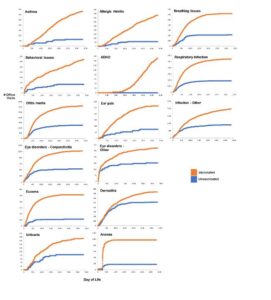
Remarkably, zero of the 561 unvaccinated patients in the study had attention deficit hyperactivity disorder (ADHD) compared to 0.063% of the (partially and fully) vaccinated. The implications of these results for the net public health effects of whole-population vaccination and with respect for informed consent on human health are compelling. Our results give agency to calls for research conducted by individuals who are independent of any funding sources related to the vaccine industry. While the low rates of developmental disorders prevented sufficiently powered hypothesis testing, it is notable that the overall rate of autism spectrum disorder (0.84%) in the cohort is half that of the US national rate (1.69%). The practice-wide rate of ADHD was roughly half of the national rate. The data indicate that unvaccinated children in the practice are not unhealthier than the vaccinated and indeed the overall results may indicate that the unvaccinated pediatric patients in this practice are healthier overall than the vaccinated.
Vaccines are widely regarded as safe and effective within the medical community and are an integral part of the current American medical system. While the benefits of vaccination have been estimated in numerous studies, negative and nonspecific impact of vaccines on human health have not been well studied. Most recently, it has been determined [1,2] that variation exists in individual responses to vaccines, that differences exist in the safety profile of live and inactivated vaccines, and that simultaneous administration of live and inactivated vaccines may be associated with poor outcomes. Studies have not been published that report on the total outcomes from vaccinations, or the increase or decrease in total infections in vaccinated individuals.
A few independent (non-CDC) studies do exist that have compared outcomes between vaccinated and unvaccinated children. A small survey study of 415 families with homeschooled children by Mawson et al., 2017 [9] that compared vaccinated with completely unvaccinated children reported increased risk of many diagnoses among the vaccinated children including (condition, fold-increase): allergic rhinitis (30.1), learning disabilities (5.2), attention deficit hyperactivity disorder (ADHD) (4.2), autism (4.2), neurodevelopmental disorders (3.7), eczema (2.9), and chronic illness (2.4). The increased risk of neurodevelopmental disorders appeared to be higher in cases of preterm births. A study from Germany (Schmitz et al., 2011) [10] reported no increases in adverse outcomes other than atopy.
We performed a retrospective analysis spanning ten years of pediatric practice focused on patients with variable vaccination born into a practice, presenting a unique opportunity to study the effects of variable vaccination on outcomes. The average total incidence of billed office visits per outcome related to the outcomes were compared across groups (Relative Incidence of Office Visit (RIOV)). RIOV is shown to be more powerful than odds ratio of diagnoses. Full cohort, cumulative incidence analyses, matched for days of care, and matched for family history analyses were conducted across quantiles of vaccine uptake. Increased office visits related to many diagnoses were robust to days-of-care-matched analyses, family history, gender block, age block, and false discovery risk. Many outcomes had high RIOV odds ratios after matching for days-of-care (e.g., anemia (6.334), asthma (3.496), allergic rhinitis (6.479), and sinusitis (3.529), all significant under the Z-test). Developmental disorders were determined to be difficult to study due to extremely low prevalence in the practice, potentially attributable to high rates of vaccine cessation upon adverse events and family history of autoimmunity.
http://ipaknowledge.org/ipak-vaxxed-v-unvaxxed-study.php
